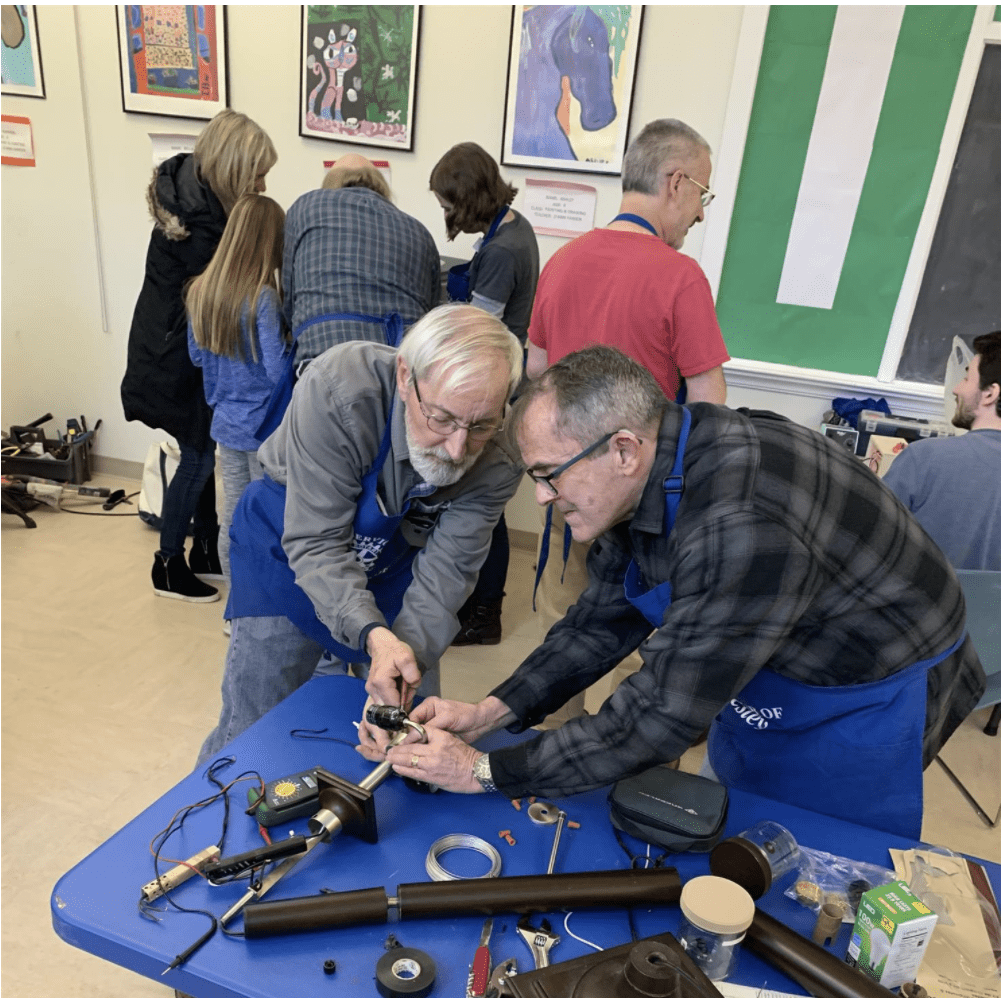Repair Cafe
How do you keep clothes, coffee makers, and damaged furniture out of landfills?

Repair Cafe
Website Link : Website.
Description
How do you keep clothes, coffee makers, and damaged furniture out of landfills? Recruit a few handy friends, and start a local Repair Café! Started in Holland by Martine Postma in 2007, Repair Cafés are now popping up worldwide, with over 2,200 in operation. The website, readable in Dutch, English, French, German, and Spanish, is packed with practical advice and creative solutions. By empowering their communities to fix stuff instead of throwing it away, Rotarians will reduce emissions from mining, manufacturing, and transportation.
“It’s a lot of fun to get together on a Saturday morning,” says John Adams, the environmental chair of the Rotary Club of Wellesley, Massachusetts, which holds Repair Cafés quarterly “Basically you call your friends who know how to fix stuff.” Next: invite the public, borrow a community space, and get ready to tackle anything from gluing the ear back on a beloved toy rabbit to actually fixing a toaster.
“People will bring their kids along, and the thing they want to fix. First we have them Google the problem, then we coach them,” Adams explains. “We help people figure out what is broken, find the part number, and then order the new one. We see more and more people trying to fix stuff.”
Most residents of Wellesley, a wealthy suburb of Boston, can afford to discard used things and buy new, but environmental stewardship is catching on in town. Partnering with the US Environmental Protection Agency, the town’s Sustainable Energy Committee launched WasteWise Wellesley in 2016 to foster sustainable materials management throughout the community. They expanded the range of materials that can be recycled, set up a “give and take” area at the Recycle and Disposal facility, and started a Library of Things where people can borrow anything from a fancy cake pan to an adapter. Ellen Corpi, a civic leader, found out about Repair Cafés and contacted John Adams, suggesting it would be a great project for a Rotary Club.
Adams had started a handyman business after retiring from his career as a software engineer. “It was not as much fun as I thought it would be running it as a business, but it allowed me to buy a whole lot of fun tools,” he confesses. Intrigued by Corpi’s idea, he recruited a team. “I know who’s good at what. I ask, and that hooks them. Once you fix everything in your house, you want to go find more stuff to fix. A guy from Dover is my hero: he knows all about electronics. I get total tool envy watching him bring his stuff in.”
The Repair Café is “cheap to run,” Adams says. “Wellesley’s Recreation Center club lets the Club use a room for free.” 6-7 people with different tools and expertise set up shop at tables around the room: a sewing machine, a furniture repair booth, knife sharpening.
The team promotes the event through Facebook with delightful action shots (including those here). It draws people of every age. “The Club has a mailing list of up to 800 people from previous events,” Adams says. “The last two Repair Cafes, some engineering types in their twenties came in. Our coaches have children and grandchildren and are glad to teach children. We’ve fixed a baby doll bed and a powered skateboard.
As a totally inclusive, hands-on experience of Service Above Self, the Repair Cafe is fabulous publicity for this Rotary Club – “good, wonderful, or excellent ratings,” Adams says – as Wellesley Rotarians teach smart solutions to an environmental crisis more and more people are taking seriously.
